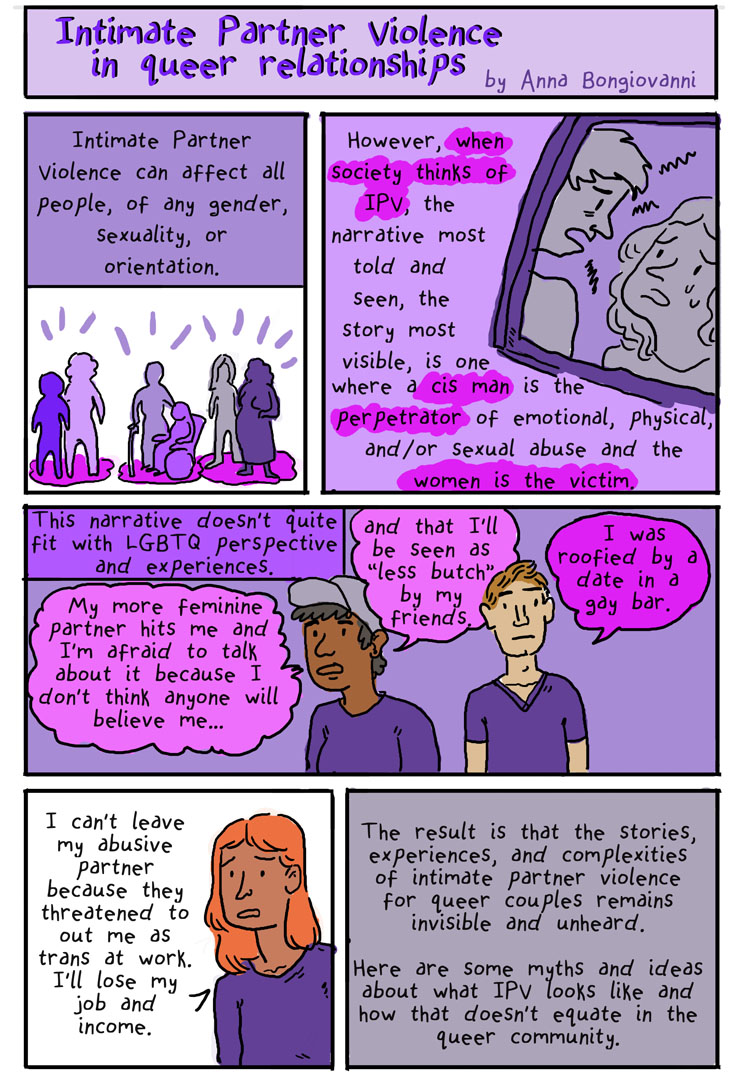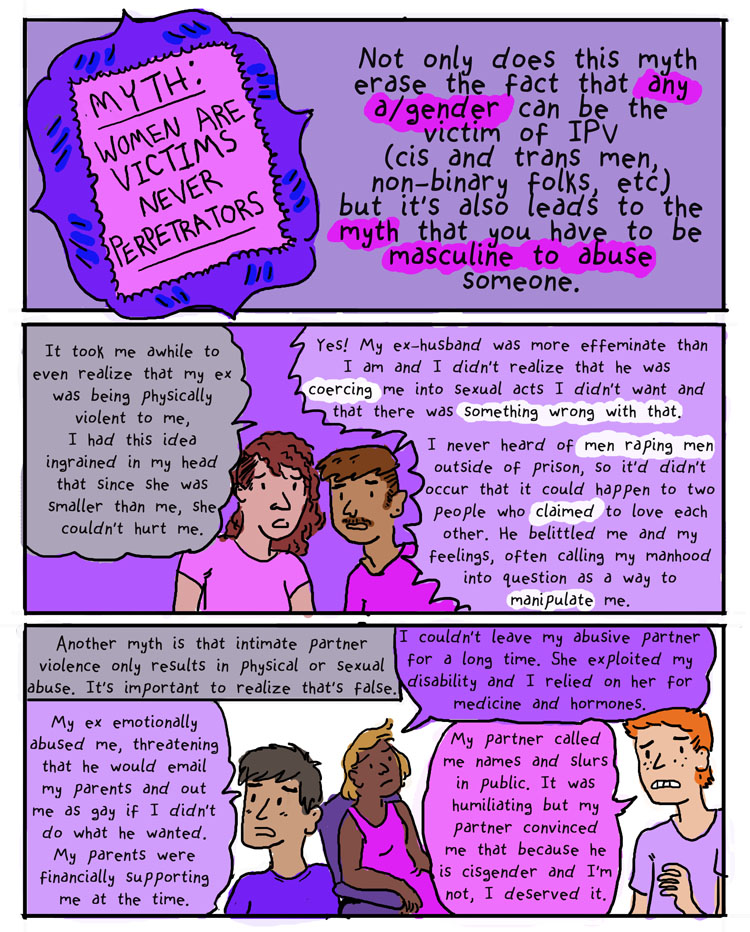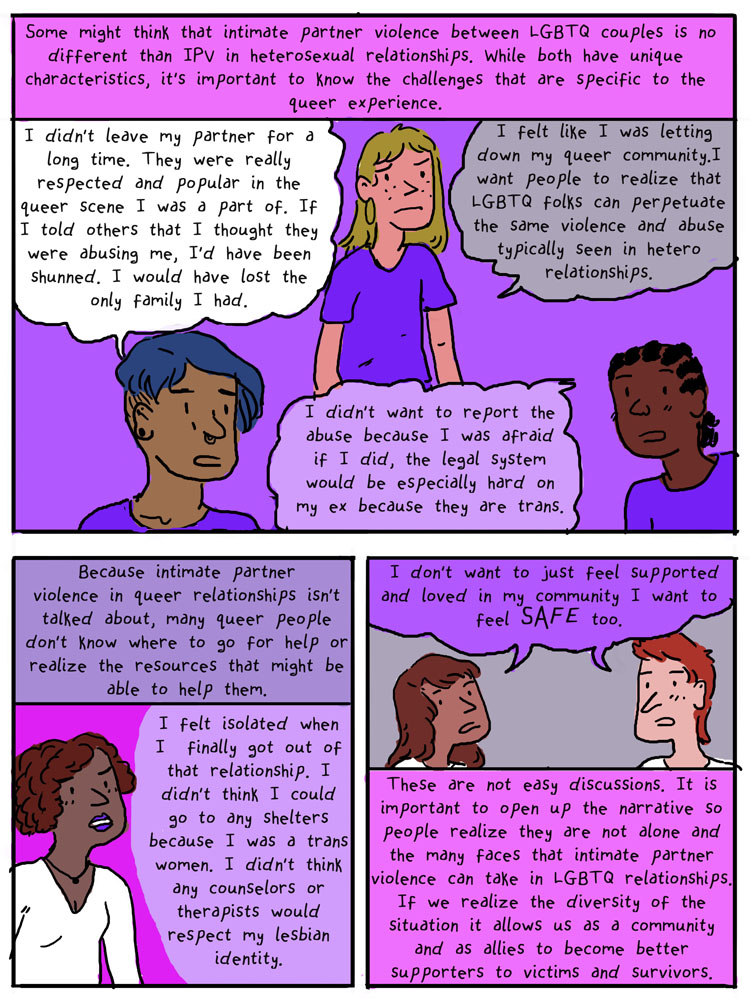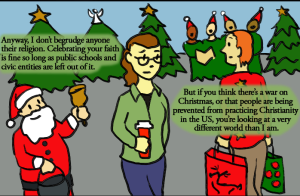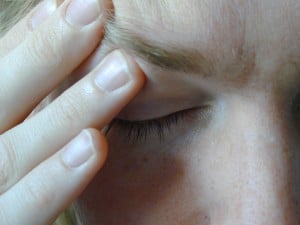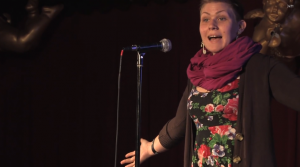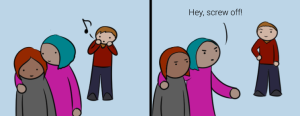Panel 1
(A series of shaded, muted couples of many orientations, genders, sexualities)
Text: Intimate Partner Violence can affect all people, of any gender, sexuality, or orientation.
Panel 2
(A picture of a television, with a simple outside of a man yelling at a women)
Text: However, when society thinks of IPV, the narrative most told and seen, the story most visible, is one where a cis man is the perpetrator of emotional, physical, and/or sexual abuse and the woman is the victim.
Panel 3
(A long panel with three people speaking)
Text: This narrative doesn’t quite fit with LGBTQ perspective and experiences.
Person 1: My more feminine partner hits me and I’m afraid to talk about it because I don’t think anyone will believe me and that I’ll be seen as “less butch” by my friends.
Person 2: I was roofied by a date in a gay bar.
Person 3 I can’t leave my abusive partner because they threatened to out me as trans at work. I’ll lose my job and income.
Text: The result is that the stories, experiences, and complexities of intimate partner violence for queer couples remains invisible and unheard. Here are some myths and ideas about what IPV looks like and how that doesn’t equate in the queer community.
Panel 4
(A picture frame with the myth in it, with text next to it)
Myth: Women Are Victims, never perpetrators.
Text: Not only does this myth erase the fact that any a/gender can be the victim of IPV (cis and trans men, non-binary folks, etc) but it’s also leads to the myth that you have to be masculine to abuse someone.
Panel 5
(Two people, talking to each other. Person one is a cis women, and person two is a cis man.)
Person 1: It took me awhile to even realize that my ex was being physically violent to me, I had this idea ingrained in my head that since she was smaller than me, she couldn’t hurt me.
Person 2: Yes! My ex-husband was more effeminate than I am and I didn’t realize that he was coercing me into sexual acts I didn’t want and that there was something wrong with that. I never heard of men raping men outside of prison, so it’d didn’t occur that it could happen to two people who claimed to love each other. He belittled me and my feelings, often calling my manhood into question as a way to manipulate me.
Panel 6
(Three different people talking to the audience)
Text: Another myth is that intimate partner violence only results in physical or sexual abuse. It’s important to realize that’s false.
Person 1: My ex emotionally abused me, threatening that he would email my parents and out me as gay if I didn’t do what he wanted. My parents were financially supporting me at the time and I felt like there wasn’t anything I could do.
Person 2: I couldn’t leave my abusive partner for a long time. She exploited my disability and I relied on her for medicine and hormones.
Person 3: My partner called me names and slurs in public. It was humiliating but my partner convinced me that because he is cisgender and I’m not, I deserved it.
Panel 7
(Three people talking to the audience)
Text: Some might think that intimate partner violence between LGBTQ couples is no different than IPV in heterosexual relationships. While both have unique characteristics, it’s important to know the challenges that are specific to the queer experience.
Person 1: I didn’t leave my partner for a long time. They were really respected and popular in the queer scene I was a part of. If I told others that I thought they were abusing me, I’d have been shunned. I would have lost the only family I had.
Person 2: I felt like I was letting down my queer community. There was so much talk of equality and rights and rainbows and there I was: saying a queer advocate had emotionally abused me and raining on everyone’s parade.
Person 3: I didn’t want to report the abuse because I was afraid if I did, the legal system would be especially hard on my ex because they are trans.
Panel 8
(Person talking to the audience)
Text: Because intimate partner violence in queer relationships isn’t talked about, many queer people don’t know where to go for help or realize the resources that might be able to help them.
Person 1: I felt so isolated when I was finally able to get out of that relationship. I didn’t think I could go to any shelters because I was a trans women. I didn’t think any counselors or therapists would respect my lesbian identity.
Panel 9
(Two different people talking to the audience)
Person 1: I want to know that my experiences are not an abnormal. I want people to realize that LGBTQ folks can perpetuate the same violence and abuse typically seen in hetero relationships.
Person 2: I don’t want to just feel supported and loved in my community I want to feel SAFE too.
Text: These are not easy discussions. However it is important to open up the narrative so people realize they are not alone and the many faces that intimate partner violence can take in LGBTQ relationships. If we realize the diversity of the situation and the problem that allows us as a community and as allies to become better supporters to victims and survivors.
